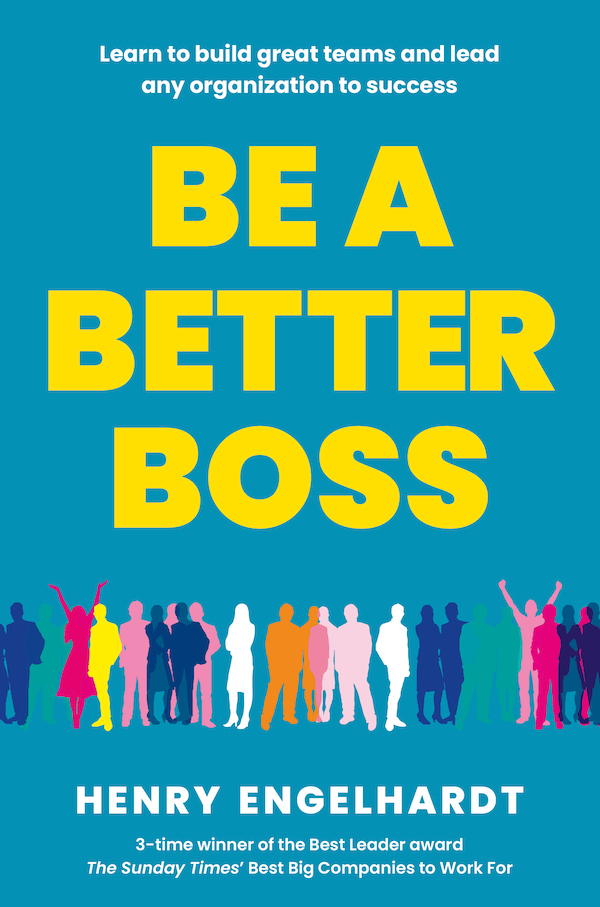As the Liaison Committee is embarking on its inquiry into strategic thinking in government, I wonder what the civil and diplomatic services could learn from how the founder and CEO of Admiral Group, Henry Engelhardt, grew his company. From starting with just a handful of staff, the company now has over 10,000 employees, with £3.4bn in revenues. It is worth £7.8bn. Be a Better Boss sets out what Engelhardt believes is Admiral Group’s unique management philosophy. In the introduction, he writes: “I believe that even if you’re a manager in the public sector... much in this book can work for you.”
 ❱ Be a Better Boss: Learn to build great teams and lead any organization to success
❱ Be a Better Boss: Learn to build great teams and lead any organization to success
❱ Henry Engelhardt
❱ Whitefox Publishing Ltd
Don’t be put off by the initial biographical details. There is more value in the later Admiral stories. From Elephant, a market leader in digitising the insurance sign-up process, to the decision to offer customers eight-month rather than 12-month contracts, these stories are intriguing. Why an eight rather than a 12-month contract? Because competitors contacted customers with marketing materials three months after they had already renewed with Admiral. In return, customers received their annual no-claims discount four months early.
This book gives insight into what one kind of functional corporate culture looks like. Engelhardt explains that Admiral was rarely – if ever – a first mover. They were not the first to target high premium clients or to cut out intermediaries. What separated Admiral from the competition was effective communication, teamwork, equality, rewarding success and having fun. These might seem like buzzwords but Engelhardt makes a case that Admiral’s business adopted these values and embedded them in positive attitudes and behaviour.
He urges managers to value teamwork over individual achievement, citing a story from his time at INSEAD Business School where a professor asked everyone to carry out a task, first as a team and then individually. All but a handful of students produced a better report when they worked as a team. Individual star performers should be rewarded generously, but he rejects any outward signs of inequality among employees. Admiral has no offices for executives, no company cars, and everyone receives the same company pension contribution.
Engelhardt also believes most employees under-communicate. He stuck a picture of a golf course on his wall and used a ball of blue tack to tell his employees how he was feeling. When the blue-tack ball was in the water, he was not to be disturbed. Irritating perhaps, but very human.
“Unlike Francis Maude, Engelhardt opposes outside hires”
What lessons are there in this book for ministers and civil service leaders? Unlike Francis Maude, Engelhardt opposes outside hires. Instead, he recommends hiring promising recruits and watching how they function in junior positions. It is certainly true that Whitehall outside hires have either been absorbed into the prevailing culture or have left, leaving no impact. More sympathetic to the Maude world view, he argues against outsourcing to consultants. Too often, when a management consultant puts together a slide deck and you have a question about the methodology, it can take weeks to receive a proper answer. The person presenting should be able to explain where the data came from, what assumptions they made, and how to reproduce a modified version of the chart. There is no substitute for in-house expertise, experience and knowledge, made all but impossible by the present churning of officials across roles and departments.
After reading Engelhardt’s book, you might be left wondering whether an effective manager (or permanent secretary) can transform an existing organisation. When Engelhardt visited the office of a potential acquisition in America, he noticed that the managers all had exterior offices with city views. The rest of the employees were boxed into the centre of the office without natural light. Engelhardt decided this reflected a hierarchical culture antithetical to Admiral’s emphasis on equality. He did not make an offer.
If a civil service department has a poor culture, starting over is not an option. Governments cannot govern at all unless ministers learn to lead the civil servants they have got, but that does not preclude also having a transformation plan. Perhaps there is a management book by a CEO who transformed an existing business. Sir John Egan at Jaguar in the early 1980s was my hero. It is far harder to transform engrained cultures than create new institutions from scratch, but that is the challenge facing this generation of permanent secretaries – and the next.
Sir Bernard Jenkin is MP for Harwich and North Essex and chair of the Liaison Committee